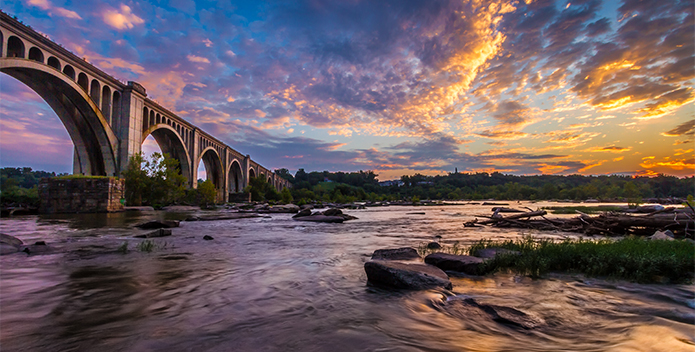There is perhaps no document more revealing than a budget. Whether a household, school district, or government, a budget reveals the priorities of a group in unequivocal terms. And as we fight to save the Bay and its rivers and streams, budgets on the state and federal level are hugely consequential to improving water quality.
Right now, members of the Virginia General Assembly's budget conference committee are meeting to reconcile the differences between the House and Senate budgets. With the power to make major investments in the future of Virginia's waterways, we are urging them to invest in several programs which address issues affecting clean water:
- Agriculture: The most cost-effective way to reduce nitrogen and phosphorus pollution to the Bay is implementing best management practices on farms. Investments in agricultural cost-share programs help farms complete projects such as excluding livestock from streams and planting buffers along waterways keep excess nutrients out of our waterways.
- Polluted Runoff: In Virginia's cities and suburbs, rain water running off our parking lots, streets, roofs, and driveways carries pet waste, pesticides, oil, and other contaminants into our waterways. The Stormwater Local Assistance Fund provides critical grants to localities to install projects such as living shorelines and stream restorations.
- Oysters: Always a critical priority, this keystone species improves water quality, provides habitat to critters, and is an economic powerhouse to the region. Investments in oyster restoration pay dividends to all Virginians.
As we strive to leave a legacy of clean water to future generations, the budgets we leave behind will expose in unambiguous terms how highly we valued clean water. Virginians, the budget conference committee members need to hear from you now. Take action—urge them to invest in clean water because the health of Virginia's rivers, streams, and the Bay is important to you.
This Week in the Watershed: Punting Menhaden, Climate Maps, and Burning Trash
- Oysters are receiving plenty of attention in this year's Maryland legislative session. (Capital Gazette—MD) BONUS: Learn more about CBF's legislative priorities in Maryland!
- A new interactive map reveals the extent climate change will influence the United States by 2080. (Bay Journal)
- Virginia punted on making any decision on the proposed catch limits for menhaden in the Chesapeake Bay. (Daily Press—PA)
- Baltimore's City Council approved a bill applying stringent emissions limits on the Wheelabrator trash incinerator, the city's single largest source of air pollution. (Baltimore Sun—MD)
- The lack of federal action to reduce interstate air pollution caused CBF and other environmental groups to file a lawsuit against the EPA. (Bay Journal) BONUS: CBF Press Statement
What's Happening around the Watershed?
February 21
- Baltimore, MD: Join us for the second film in Docs on the Docks film series, featuring the award-winning documentary Trash Dance. This film highlights the unseen men and women who pick up our trash. Immediately following the viewing, an expert panel will discuss the film and encourage participants to advocate for change in their communities, city, and watershed. Register here!
- Annapolis, MD: Interested in having the beachfront wedding of your dreams? Come visit CBF headquarters for our bridal open house. Learn more and register here!
- Annapolis, MD: Join CBF, the Maryland League of Conservation Voters, Sierra Club, and other environmental groups to advocate for Maryland's forests. We are meeting with legislators and sharing information about important legislation that will strengthen and improve Maryland's forest laws. Learn more and register here!
- Easton, MD: Join us for the second event in our Angler's Night Out program series. Gather with anglers and fishing aficionados from around the Shore to watch fishing flicks, hear from experts and guides, and mingle with friends while enjoying food and drink specials. Learn more and register!
- Weyers Cave, VA: Shenandoah Valley landowners, farm managers, and hunters are invited to join us to learn the ins and outs of planting and maintaining riparian buffers that improve local water quality and support wildlife. Staff from CBF, Natural Resource Conservation Service, and Virginia Department of Forestry will share technical and financial resources that can kickstart projects to plant riparian buffers. Learn more and register here!
March 14
- Newport News, VA: As more local oyster farms are producing oysters, join us to indulge in some this beloved bivalve and learn more about this growing industry from a local oyster farmer. Learn more and register here!
March 19
- Richmond, VA: As more local oyster farms are producing oysters, join us to indulge in some this beloved bivalve and learn more about this growing industry from a local oyster farmer. Learn more and register here!

Issues in this Post
Chesapeake Clean Water Blueprint Advocacy Agriculture Conservation Eastern Oysters Runoff Pollution Restoration Virginia's Agricultural Cost-Share Program Virginia's Stormwater Local Assistance Fund CBF in Maryland CBF in Virginia Eastern Shore Office CBF at the Federal Level Hampton Roads Office Maryland Office, Annapolis CBF in Pennsylvania Virginia Office, Richmond



